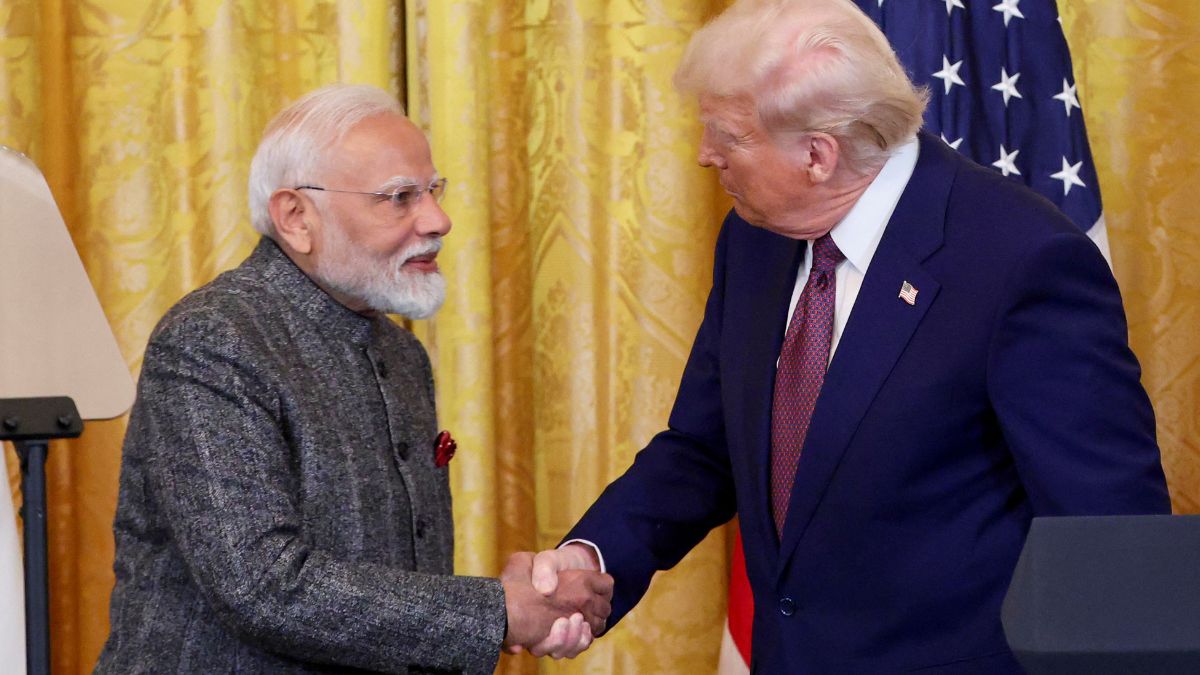Prime Minister Narendra Modi and United States President Donald Trump held a bilateral meeting on Thursday (February 13) at the White House, discussing trade issues, easing tariffs and enhancing defence ties. The two leaders also addressed a joint press conference where the US president was asked questions about Khalistanis in America.
Before the bilateral meeting with the Indian leader, Trump also replied to queries about Bangladesh. His response on both is a positive signal for India. New Delhi has had tense relations with Bangladesh’s interim government led by Muhammad Yunus. India has also raised the issue of Sikh separatists in the US, which it sees as a security threat.
Let’s take a closer look.
‘I will leave Bangladesh to PM Modi’
The US President has denied any role of the American “deep state” in the affairs of Bangladesh.
The issue also came up during talks between the two leaders, with Modi expressing concerns about the developments in the neighbouring country, as per an Indian Express report.
Replying to questions about the “role” of the “US deep state” in Bangladesh, Trump, ahead of his meeting with PM Modi in the Oval Office, said, “Well, there was no role for our deep state… This is something that the Prime Minister has been working on for a long time and has been working on it for hundreds of years. Frankly, I’ve been reading about it, but I will leave Bangladesh to the Prime Minister.”
#WATCH | Washington, DC: When asked about the Bangladesh issue, US President Donald Trump says, " There is no role for our deep state. This is something that PM has been working on for a long time and has worked on for hundreds of years...I have been reading about it. I will… pic.twitter.com/0B8Ortxx60
— ANI (@ANI) February 13, 2025
Impact Shorts
More ShortsTrump’s comments reflect the US is unlikely to interfere in India’s decision regarding Bangladesh or act on Dhaka’s behalf.
Following Trump’s remarks, India’s Foreign Secretary Vikram Misri said, “On what we make of the statement on Bangladesh… this was a subject that was discussed between the two leaders. And the Prime Minister shared his views and, indeed, his concerns with regard to recent developments in Bangladesh and how India sees the situation.”
“I think we hope that the situation in Bangladesh will also move forward in a direction where we can pursue relations in a constructive and stable way with them. But there are concerns about that situation. And the Prime Minister shared those views with President Trump,” Misri said.
Trump has previously condemned the violence against minorities in Bangladesh, saying it would have “never happened on my watch”. Before the November US presidential elections, the Republican promised to “protect” Hindu Americans “against the anti-religion agenda of the radical left”.
“Under my administration, we will also strengthen our great partnership with India and my good friend, Prime Minister Modi,” he said in a tweet last October.
I strongly condemn the barbaric violence against Hindus, Christians, and other minorities who are getting attacked and looted by mobs in Bangladesh, which remains in a total state of chaos.
— Donald J. Trump (@realDonaldTrump) October 31, 2024
It would have never happened on my watch. Kamala and Joe have ignored Hindus across the…
In August, a student-led protest in Bangladesh led to the ouster of the then Prime Minister Sheikh Hasina, who resigned and fled to India. Later, an interim government led by Nobel Laureate Muhammad Yunus was installed.
After the Hasina government collapsed, Bangladesh witnessed several attacks on minorities, including Hindus. PM Modi also brought up this issue with Yunus as India pressed for the safety and security of minorities in the neighbouring country. Relations between the two countries have remained tense since then.
The Yunus government has sought Hasina’s extradition, to which India has not responded yet.
Bangladesh-US ties
Ties between Bangladesh and the US plummeted under Hasina and Biden .
Under the previous Biden administration, the US was openly critical of Hasina’s crackdown on civil society, media and opposition. The American government said the January 7 elections in Bangladesh last year, which were boycotted by the main opposition – the Bangladesh Nationalist Party (BNP), were neither free nor fair.
Hasina for long blamed Biden for attempting to dethrone her. In April 2023, while speaking in the Bangladesh Parliament, she alleged, “The US can overthrow the government in any country, particularly Muslim countries.”
Last July, during the student-led protest movement in Bangladesh, the US urged Hasina’s Awami League government to “uphold the right to peaceful protest.”
Hasina was ousted by August. Last month, Trump returned to the White House. Soon after his return to power, he suspended all foreign aid, a big setback for Bangladesh. Dhaka is a major recipient of funds from the United States Agency for International Development (USAID).
As per South China Morning Post (SCMP), analysts say this could hamper Bangladesh’s bid to stabilise its economy and hold national elections.
Trump on Khalistan
Trump was asked about Khalistanis in the US . While he did not give a direct reply, the US president said India and the US worked together on crime.
Trump says this when asked about Khalistanis and it’s very telling:
— Shubhangi Sharma (@ItsShubhangi) February 14, 2025
He says India didn’t have a good relationship with the Biden administration. Very inappropriate things happened between them. Then mentions Tahawwur Rana’s extradition who he seems to know little about except… pic.twitter.com/HibYyTfxNA
“Strengthen law enforcement cooperation to take decisive action against organised crime syndicates, including narco-terrorists, human and arms traffickers as well as other elements who threaten public and diplomatic safety and security, and the sovereignty and territorial integrity of both nations,” read a joint statement after PM Modi and President Trump’s bilateral meeting.
With inputs from agencies


)

)
)
)
)
)
)
)
)



